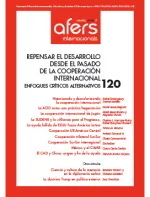Trilateral South-South cooperation for development: towards a decolonisation of solidarity

Trilateral South-South Cooperation (TSSC) for development has generated great debate over whether these alliances constitute a new paradigm for development or merely disguise a new form of imperialism. Beyond categorisations, this paper presents a more nuanced image and examines the focus of TSSC solidarity, specifically, the intrinsically political nature of development and the unequal power relations at its heart. Starting with the TSSC memorandum of understanding (MoU) between Brazil, Mozambique and the World Bank, the narratives are analysed of agricultural development and the social imaginaries that support it in order to better understand the patterns and motivations of solidarity. By showing the colonial, capitalist and patriarchal rationale that persists in the conception of solidarity used in the current development framework, this paper proposes the decolonisation of this concept.
Key words: trilateral South-South cooperation, development, solidarity, Brazil, Mozambique, World Bank
DOI: doi.org/10.24241/rcai.2018.120.3.147